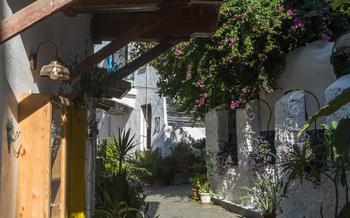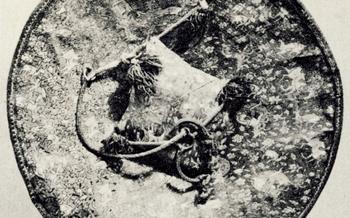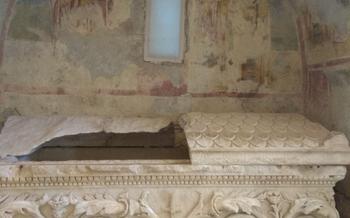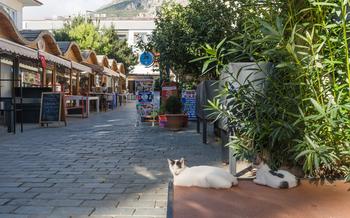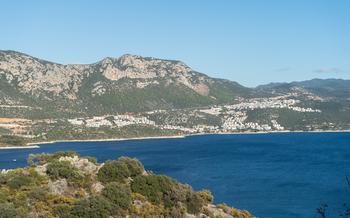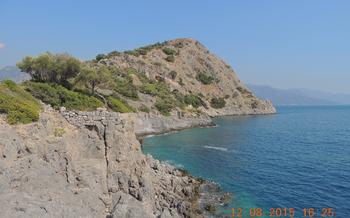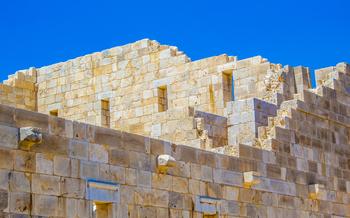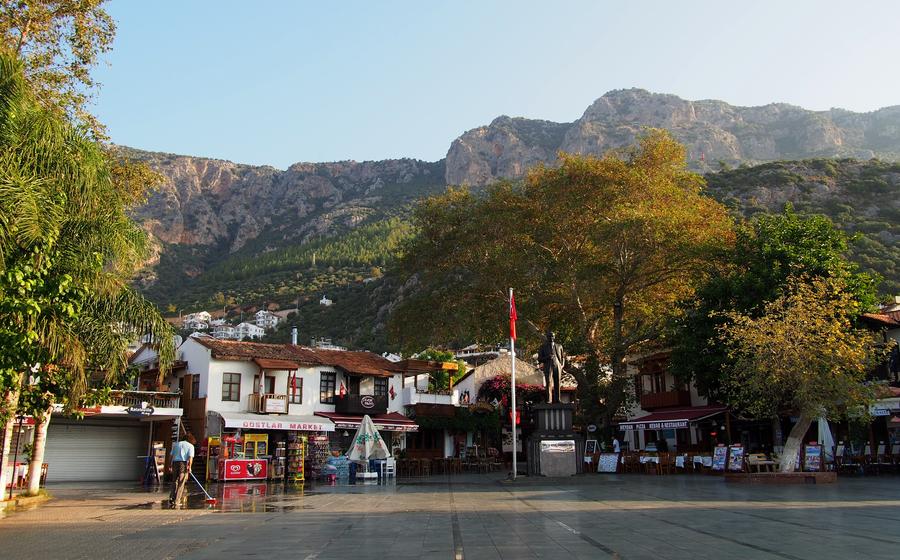
Demre (Myra) Ancient City
- Demre (Myra), the Ancient City:
- Exploring the Ruins
- History of Myra from Ancient to Byzantine Times
- Saint Nicholas Church and Legacy
- Practical Tips for Visiting Myra
- Unique Experiences in Myra
- Myra's Archaeological Museum
- Demre's Natural Beauty
- Tips for Exploring Demre's Natural Wonders
- Local Cuisine and Flavors
- Shopping in Demre and Kaş
- Accommodation Options in Demre
- Day Trips and Excursions
- Cultural and Historical Significance
- Local Customs and Traditions
- Insider Tip:
Demre (Myra), the Ancient City:
Demre, the ancient city of Myra, is a treasure trove of history and cultural heritage. Once the capital of ancient Lycia, Myra flourished as a major port and trading center on the Mediterranean. Its strategic location along the trade routes allowed it to connect with diverse civilizations, leading to a rich blend of cultures and influences. The city's well-preserved ruins, including its impressive theater and intricate rock-cut tombs, stand as a testament to its past grandeur. Myra's contributions to the region's cultural legacy are significant, making it an essential destination for those seeking to delve into the depths of ancient history and civilization.
Exploring the Ruins
The Theatre of Myra
The theatre of Myra is a magnificent sight, with its well-preserved seating tiers rising up the hillside. It could accommodate up to 5,000 spectators who would have enjoyed performances of plays, concerts, and other events. The acoustics are excellent, and the views from the upper tiers are stunning, taking in the ancient city, the surrounding mountains, and the Mediterranean Sea beyond.
The Rock-Cut Tombs
Myra is also known for its impressive rock-cut tombs. These tombs, carved into the sheer rock faces of the cliffs, are a testament to the skill and artistry of the ancient Lycians. The tombs vary in size and design, from simple niches to elaborate facades with intricate carvings. Some of the tombs feature inscriptions or reliefs depicting scenes from mythology or daily life.
Other Ruins and Remains
In addition to the theatre and tombs, many other ruins and remains can be explored in Myra. These include the remains of churches, baths, city walls, and other public buildings. Visitors can see the foundations of the ancient city's grid system and imagine the bustling streets and marketplaces that once existed here.
Navigating the Ancient Site
The ancient site of Myra is spread out over a large area, so it's helpful to have a map or guide to help you navigate. The main attractions are relatively close together, but there are some steep paths and uneven surfaces to be aware of. Comfortable shoes are recommended, and it's a good idea to bring water and sunscreen, especially during the hot summer months.
History of Myra from Ancient to Byzantine Times
The foundation of Myra dates back to the 5th century BC when it was established by the Lycians, an ancient civilization that inhabited the southwestern region of Anatolia. Under Lycian rule, Myra flourished as a major port and trading center, strategically located along the lucrative Mediterranean trade routes. Its favorable position facilitated the exchange of goods and ideas, contributing to the city's cultural and economic growth.
During the Roman period, Myra became part of the Roman province of Lycia and continued to prosper. The city's importance as a trading hub remained intact, and it served as a vital link between the Roman Empire and the eastern Mediterranean. Myra's strategic location also made it a significant military outpost, further enhancing its status and influence.
In the 4th century AD, Myra transitioned to Byzantine rule, marking a new era in its history. This period witnessed the spread of Christianity throughout the region, and Myra emerged as a prominent center of Christian faith. The city became the birthplace of Saint Nicholas, who later became known as the patron saint of sailors and children, solidifying Myra's religious significance.
Myra's rich and diverse history has left an indelible mark on the city's cultural heritage. The ruins of ancient Myra, including the well-preserved theatre, rock-cut tombs, and other remnants of its glorious past, stand as testaments to its enduring legacy.
Saint Nicholas Church and Legacy
Saint Nicholas, the beloved patron saint of sailors and children, is deeply associated with the city of Myra. According to tradition, Saint Nicholas was born in Myra in the 3rd century AD. He became a bishop and was known for his generosity and kindness, earning him the reputation as a miracle worker.
The Church of Saint Nicholas, built in the 6th century AD, stands as a testament to his legacy. This impressive structure features a blend of Byzantine and Gothic architectural styles, with intricate mosaics and frescoes depicting scenes from Saint Nicholas' life. The church also houses his tomb, which has become a significant pilgrimage site for devotees from around the world.
Saint Nicholas' reputation for generosity and kindness has led to the tradition of gift-giving on his feast day, December 6th. This tradition, which eventually evolved into the modern-day Santa Claus, is a testament to the enduring legacy of Saint Nicholas as a symbol of compassion and giving.
Practical Tips for Visiting Myra
When planning your visit to Myra, consider the best time to visit, fees and transportation options. The best time to visit Myra is during the shoulder seasons, in spring (April-May) or autumn (September-October), when the weather is pleasant, and the crowds are smaller. During the summer months, temperatures can be scorching, and the site can be crowded with tourists.
Admission fees are relatively affordable, and guided tours are available for a more in-depth exploration of the site. Several transportation options are available to reach Myra. You can take a bus from Antalya or Kaş, or rent a car for a more flexible and independent experience.
To make your exploration more comfortable, wear appropriate clothing and footwear. The terrain can be uneven, so comfortable shoes are a must. Also, bring a hat, sunglasses, and sunscreen to protect yourself from the sun.
To maximize your time, consider combining a visit to Myra with other nearby attractions. Myra is located close to several other ancient sites, such as Kekova Island, Xanthos, and Patara. You can easily combine a visit to Myra with a day trip to one of these sites.
Unique Experiences in Myra
Beyond exploring the ancient ruins, Myra offers a wealth of unique experiences that immerse visitors in the region's culture and natural beauty. Indulge in a traditional Turkish coffee ceremony at a local café, where you can savor the rich aroma and taste of this beloved beverage while mingling with locals. For a culinary delight, savor a delectable lunch of fresh seafood at a restaurant overlooking the Mediterranean Sea, where you can feast on the bounty of the region's waters while enjoying breathtaking views.
Embrace the stunning coastline of Kaş by embarking on a scenic boat tour. Cruise along the turquoise waters, marveling at the picturesque coves, hidden beaches, and towering cliffs that line the shore. Take a dip in the crystal-clear waters, snorkel amidst vibrant marine life, and soak up the Mediterranean sun.
For those seeking adventure, participate in a guided hike through the majestic Taurus Mountains. Discover hidden trails, traverse rugged terrain, and marvel at the panoramic vistas that unfold before you. Whether you're an experienced hiker or simply seeking a leisurely stroll, there's a trail to suit your preferences.
Myra's Archaeological Museum
Explore History Through Artifacts: At the Myra Archaeological Museum, history comes alive as you discover a treasure trove of artifacts from the ancient city of Myra and the surrounding region. Immerse yourself in the past as you admire ancient sculptures, pottery, and jewelry, each piece telling a unique story of Myra's rich cultural heritage.
Highlights of the Collection: The museum's collection boasts a diverse array of artifacts that provide a glimpse into Myra's glorious past. Marvel at the intricate carvings on ancient statues, depicting gods, goddesses, and legendary heroes. Delve into the daily lives of Myra's inhabitants through their ceramic vessels, lamps, and tools. And don't miss the exquisite jewelry, showcasing the skill and artistry of ancient craftsmen.
Location and Accessibility: To reach the Myra Archaeological Museum, simply head to the heart of Demre, where you'll find it conveniently located near the city's main attractions. Its central position makes it an ideal stop during your exploration of Myra's ancient ruins and the Church of Saint Nicholas.
Tips for a Rewarding Visit: To make the most of your visit to the museum, plan to spend at least an hour exploring its exhibits. Take your time to appreciate the details of each artifact, and consider hiring a guide to provide insightful commentary and historical context. For a comprehensive experience, combine your museum visit with a guided tour of Myra's ancient city to gain a deeper understanding of its rich past.
Demre's Natural Beauty
Demre is blessed with a picturesque setting, nestled between the azure waters of the Mediterranean Sea and the majestic Taurus Mountains. The town's natural beauty is a major draw for visitors, offering a variety of outdoor activities and stunning scenery.
The coastline around Demre is dotted with beautiful beaches and coves, inviting visitors to relax on the golden sands, swim in the crystal-clear waters, and soak up the sun. Some of the most popular beaches in the area include Kekova Beach, Kaputaş Beach, and Üçağız Beach.
For those seeking more active pursuits, the Taurus Mountains offer a range of hiking trails that wind through lush forests, past cascading waterfalls, and up to breathtaking viewpoints. The mountains are also home to a variety of wildlife, including wild goats, eagles, and vultures.
Whether you are looking to relax on the beach, explore the mountains, or simply marvel at the natural beauty of Demre, there is something for everyone to enjoy in this stunning destination.
Tips for Exploring Demre's Natural Wonders
-
Choose the right time to visit. The best time to visit Demre for outdoor activities is during the shoulder seasons (April-May and September-October) when the weather is warm and sunny but without the oppressive heat of the summer months.
-
Wear comfortable shoes. If you plan on doing any hiking, be sure to wear comfortable, closed-toe shoes with good traction. The trails can be rocky and uneven, so it is important to have proper footwear.
-
Bring plenty of water. It is essential to stay hydrated when exploring Demre's natural attractions, especially during the summer months. Bring a refillable water bottle and fill it up regularly.
-
Be aware of the weather. The weather in Demre can change quickly, so be sure to check the forecast before heading out on your adventure. It is always a good idea to carry a light jacket or raincoat, just in case.
-
Respect the environment. Demre's natural beauty is a precious resource, so be sure to respect the environment and leave no trace. Dispose of your trash properly, and be careful not to disturb the wildlife.
Local Cuisine and Flavors
When in Demre, embrace the opportunity to savor the delectable offerings of Turkish cuisine. The region is renowned for its fresh seafood, caught daily from the crystal-clear waters of the Mediterranean. Indulge in a tantalizing meze platter, a symphony of small dishes that showcase the diverse flavors of Turkish cuisine. Don't miss the chance to try Turkish delight, a sweet confection made from sugar, starch, and nuts, that has gained worldwide fame for its unique taste and texture.
To have an authentic culinary experience, venture into the local restaurants and avoid tourist traps. Ask for recommendations from locals or your hotel concierge to discover hidden gems that serve traditional Turkish dishes. If you're feeling adventurous, consider joining a cooking class or taking a food tour to learn the secrets of Turkish cuisine and recreate these flavors in your own kitchen.
Shopping in Demre and Kaş
Demre and Kaş offer a vibrant shopping experience, with bustling marketplaces and bazaars showcasing unique souvenirs, handmade crafts, and local products. In Demre, the weekly market is a must-visit, where you can find everything from fresh produce to traditional textiles. For a more relaxed shopping experience, head to the charming boutiques and shops in Kaş, where you can browse a variety of handmade ceramics, jewelry, and clothing.
When shopping in Demre and Kaş, don't forget to indulge in the art of bargaining. It's an expected part of the shopping culture, and you can often get a great deal if you're willing to negotiate. Be polite and friendly, and don't be afraid to walk away if you're not happy with the price.
For those looking for specific items, Demre is known for its high-quality carpets, while Kaş is renowned for its exquisite jewelry. You can also find a wide range of locally produced olive oil, honey, and spices, making for excellent souvenirs or gifts.
To make the most of your shopping experience, remember to carry cash as many vendors may not accept cards. Also, be sure to visit the shops early in the morning or late in the afternoon to avoid the midday heat.
Accommodation Options in Demre
Demre offers a diverse range of accommodation options to suit every traveler's needs and budget. Whether you seek budget-friendly guesthouses, comfortable mid-range hotels, or luxurious resorts, you'll find suitable options to make your stay in Demre comfortable and memorable.
For budget-conscious travelers, there are several guesthouses and hostels that offer basic but clean accommodations at affordable rates. These guesthouses often have a friendly and welcoming atmosphere, allowing you to connect with fellow travelers and share stories.
If you desire more comfort and amenities, Demre offers several mid-range hotels that provide comfortable rooms, private bathrooms, and essential amenities like air conditioning and Wi-Fi. These hotels are a good choice for those seeking a balance between affordability and comfort.
For a luxurious and indulgent experience, Demre boasts several upscale hotels and resorts that offer exceptional accommodations, world-class amenities, and breathtaking views of the Mediterranean Sea. These hotels often feature private balconies or terraces, swimming pools, spas, and gourmet restaurants.
When booking your accommodation in Demre, consider the time of year you're visiting and book in advance, especially during peak season, to secure the best deals and availability. You can also opt for alternative options like vacation rentals or apartments for a more immersive and local experience.
Day Trips and Excursions
Explore the wonders beyond Demre with a variety of day trips and excursions. Kekova Island, a unique and breathtaking destination, awaits just a short boat ride away. Discover the sunken city ruins and enjoy swimming in the crystal-clear waters. For sun worshippers and beach enthusiasts, Kaputaş Beach beckons with its stunning turquoise waters and golden sands. Don't miss the ancient city of Xanthos, renowned for its well-preserved ruins and Lycian tombs. Organized tours and transportation options are readily available, ensuring a hassle-free experience. Plan your day trips efficiently to maximize your time and create unforgettable memories. Consider combining multiple attractions in a single day trip for a comprehensive exploration of the region's treasures.
Cultural and Historical Significance
Myra holds immense cultural and historical significance as a former religious center and a melting pot of diverse cultures. It played a crucial role in the development of Christianity in the region, serving as the birthplace of Saint Nicholas, the beloved patron saint of sailors and children. Myra's rich history is evident in its well-preserved ancient ruins, including the impressive theatre, rock-cut tombs, churches, and city walls. The city's strategic location along trade routes facilitated cultural exchange and interaction, contributing to its unique blend of Lycian, Greek, and Roman influences. Understanding and appreciating the cultural significance of Myra enhances the overall experience of exploring this ancient city.
Local Customs and Traditions
When visiting Demre, it's important to be mindful of local customs and traditions to ensure a respectful and enjoyable experience. Here are a few things to keep in mind:
-
Dress Code: Dress modestly and avoid revealing clothing, especially when visiting religious sites like churches and mosques.
-
Social Etiquette: Greetings are essential in Turkish culture. When meeting someone for the first time, offer a handshake and a warm smile.
-
Religious Practices: Turkey is a predominantly Muslim country, and it's essential to respect local religious practices. Be mindful of prayer times and avoid disturbing religious ceremonies.
-
Interacting with Locals: Locals are generally friendly and welcoming, and they appreciate visitors who show an interest in their culture. Feel free to initiate conversations and ask questions about their way of life.
Insider Tip:
-
Explore Myra at Optimal Times: To avoid the midday heat and crowds, visit Myra early in the morning or late in the afternoon. This will ensure a more pleasant and tranquil experience as you wander through the ancient ruins.
-
Combine Myra with Kekova Island: For a full-day adventure, combine your visit to Myra with a boat tour to Kekova Island. This picturesque island offers stunning views, sunken ruins, and crystal-clear waters ideal for swimming and snorkeling.
-
Embrace the Art of Bargaining: When shopping at local markets and bazaars, don't be afraid to bargain. It's a cultural norm in Turkey, and you can often get great deals on souvenirs, handicrafts, and local products.
-
Savor Turkish Delights: Immerse yourself in Turkish culture by trying traditional Turkish coffee and delight at a local café. These culinary delights are a must-try and offer a unique taste of Turkish hospitality.
